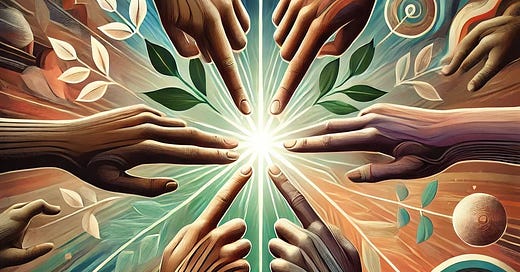From Ally to Co-Creator: Shifting the Paradigm for True Liberation
Redefining solidarity through shared accountability, transformative love, and dismantling supremacy culture from within.
Introduction:
Welcome back to the Allyship Series. Before we begin, I want to take a moment to thank those who have chosen to support this work. Your contributions help sustain the sacred practice of dismantling supremacy culture. And as always, if financial barriers prevent you from accessing these resources, you can email me at scholarships@desireebstephens.com. This work is for everyone, and no one should feel excluded.
In my previous article, Looking Within: The Radical Act of Introspection in Allyship, we explored how introspection disrupts supremacy culture by inviting white communities to examine their own barriers. Introspection is the first step in shifting from “power over” to “power with.” It’s about breaking down the internal hierarchies and creating space for true solidarity.
Today, we take that conversation further by addressing the need to move beyond seeking validation in allyship. Allyship is not about being seen as a “good ally” or receiving approval—it’s about accountability, equity, and transformation. Seeking validation keeps the focus on performance rather than practice, reinforcing the very systems we aim to dismantle.
This is also an invitation to consider a broader shift: moving from allyship to co-creation. Allyship can unintentionally reinforce power imbalances, while co-creation redefines the relationship between those engaging in liberation work as equal partners. This shift isn’t just about language—it’s about values and practices that align with the world we’re building together.
Let’s dive into why centering validation undermines allyship, what the journey to co-creation looks like, and how love and accountability serve as its foundation.
Validation and the Trap of Performance
One of the most pervasive challenges in allyship is the need for validation. In a culture that prioritizes external recognition, it’s easy to conflate being seen as an ally with being an effective one. This need for approval often leads to performative actions—gestures that signal allyship without addressing the deeper work required for systemic change.
Seeking validation creates a dynamic where marginalized groups are expected to affirm white allyship, placing yet another burden on those already navigating oppressive systems. This shifts the focus away from dismantling supremacy culture and toward individual gratification, undermining the collective nature of liberation work.




